The Link Between ADHD and Reading Challenges
Exploring the Challenges Between ADHD and Reading
Reading difficulties frequently accompany Attention-Deficit/Hyperactivity Disorder (ADHD), yet the relationship between the two goes beyond simple distractibility. This article unpacks the intricate ways in which ADHD affects reading skills, focusing on cognitive and psychological mechanisms, symptomatology, and actionable strategies to support individuals facing these linked challenges.
The Relationship Between ADHD and Reading Comprehension Challenges
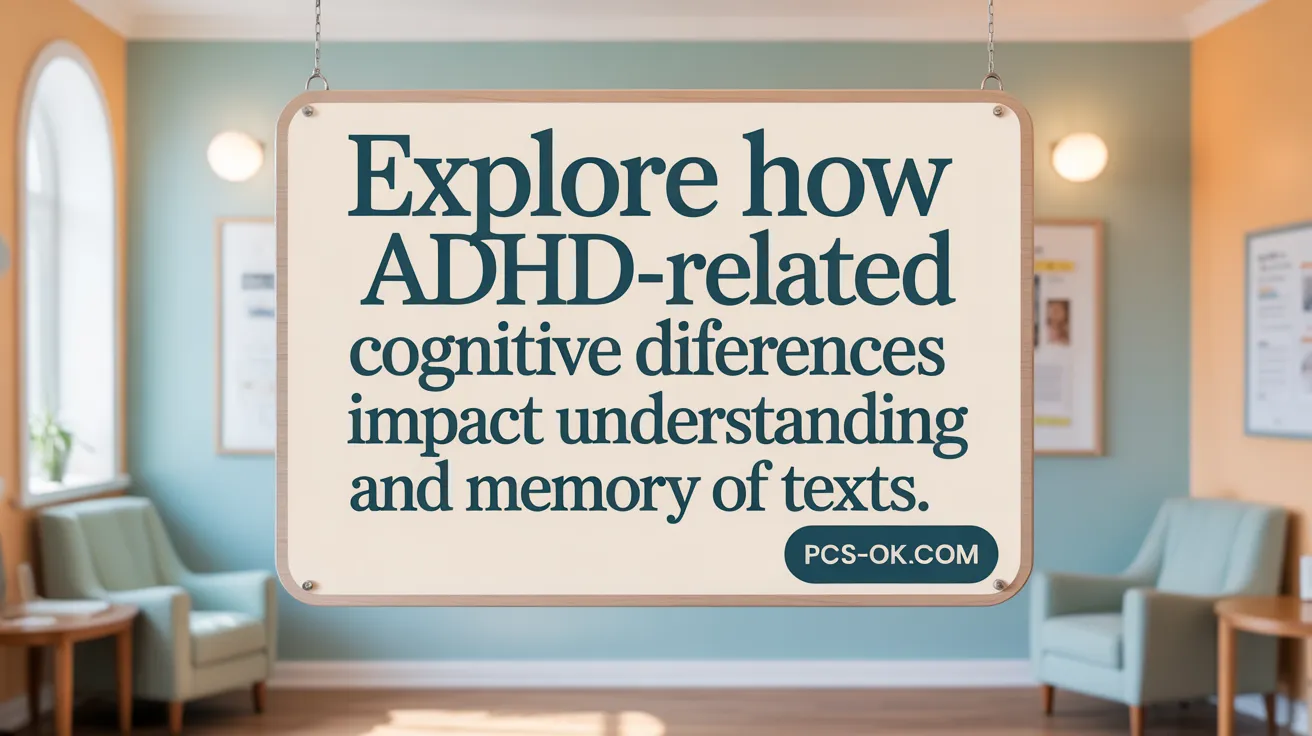
What is the relationship between ADHD and reading comprehension challenges?
Children with ADHD often face significant difficulties in understanding what they read, even when their decoding skills—such as recognizing words—are adequate. Central to these challenges is a phenomenon known as a ‘centrality deficit,’ where children struggle to recall and connect main ideas within a passage.
Research indicates that deficits in executive functions, particularly working memory, are closely linked to these comprehension issues. Working memory allows learners to hold information temporarily while integrating new details and forming a coherent understanding. When this system underperforms—as it often does in children with ADHD—comprehension suffers.
Moreover, ADHD impacts other cognitive processes like attention and self-regulation. Kids with ADHD tend to race through texts, skip important punctuation, or leave out key details, behaviors that interfere with building meaning. Their impulsivity and difficulty maintaining focus cause them to overlook critical aspects of reading material.
The combined effect of these deficits means that children with ADHD are not only less able to retain and recall central ideas but also more prone to skipping essential details, which further hampers comprehension.
While strategies such as guided reading, reducing distractions, and targeted cognitive training can offer support, understanding the core connection between ADHD-related executive function issues and reading comprehension is vital. Addressing underlying cognitive skills like working memory and self-regulation can significantly improve reading outcomes for these children.
This relationship underscores the importance of early, tailored interventions that focus on strengthening executive functions and providing accommodations that help children with ADHD engage more effectively with texts.
How ADHD Affects Reading Skills and Contributes to Reading Challenges
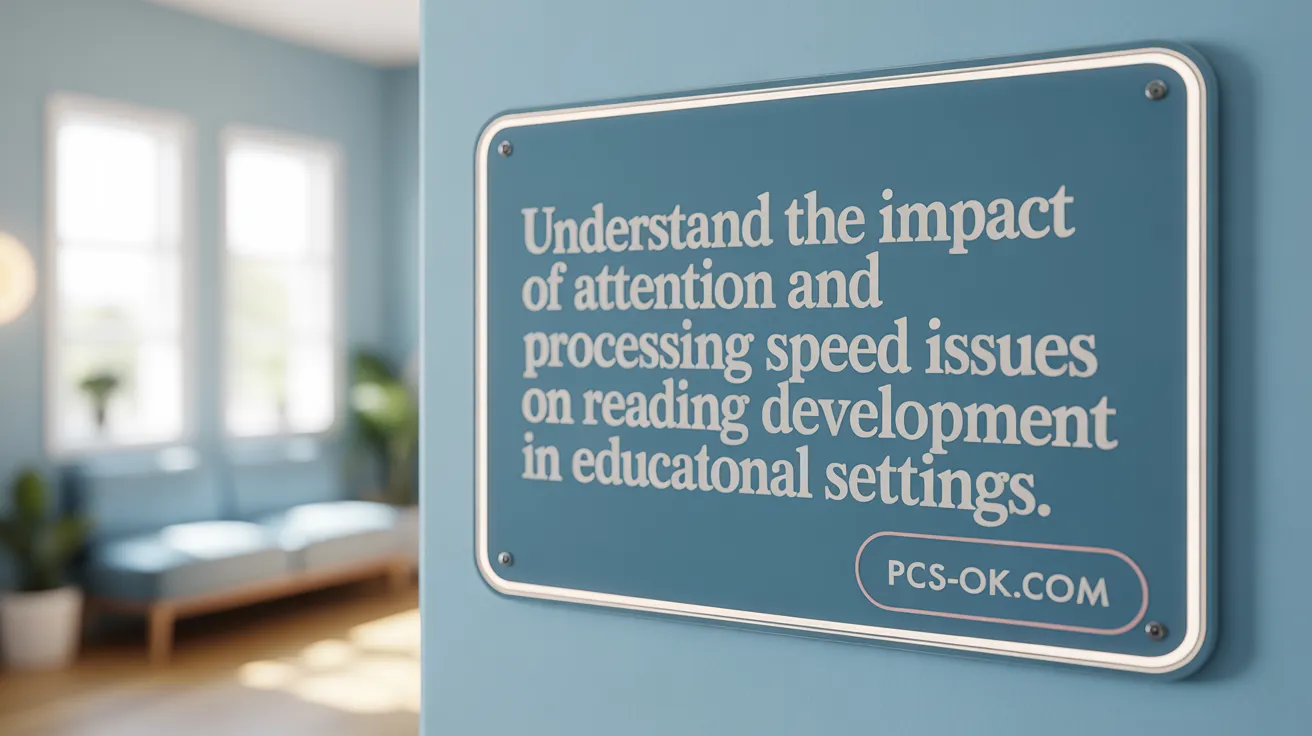
How does ADHD affect reading skills and contribute to reading challenges?
Children and adults with ADHD often face significant hurdles in developing proficient reading skills. These difficulties stem primarily from impairments in sustained attention, working memory, and executive functions.
One of the core issues is the inability to maintain focus on a reading task for extended periods. This focus deficit means individuals might skip over parts of the text, reread sentences excessively, or become distracted easily, impacting overall comprehension and reading fluency.
Working memory limitations play a crucial role here. Since working memory enables holding and manipulating information while reading, deficits can lead to a centrality problem—where recalling the main ideas of a passage becomes more difficult. This results in a centrality deficit, meaning the core ideas are less retained compared to controls, even with similar reading abilities in word recognition.
In addition to attention and memory issues, children with ADHD often experience slower processing speeds. This deceleration further hampers their ability to read fluently, as they may struggle with decoding quickly or keeping up with the pace of the reading material. Consequently, they may resort to memorization or haste, missing key details and understanding.
Comorbid learning disorders, especially dyslexia, are common among individuals with ADHD. Dyslexia is characterized by trouble recognizing words, spelling, and decoding, which compounds the challenges faced by children with ADHD. This combination tends to result in more pronounced difficulties with both decoding and comprehension.
These interconnected cognitive barriers can limit the ability to understand and remember what has been read. As a result, children and adults may skip over important information, misread sentences, or avoid reading altogether, which impacts academic performance and everyday functioning.
Fortunately, targeted strategies and accommodations can alleviate some of these issues. Examples include active reading techniques like highlighting and questioning, reducing environmental distractions, and breaking down reading tasks into manageable steps. Interventions such as guided oral reading, visual aids, and cognitive skill training (e.g., exercises designed to boost working memory and attention) can significantly improve reading outcomes.
In summary, ADHD impacts reading primarily by impairing the cognitive processes essential for fluent, meaningful reading. Recognizing these deficits allows for tailored approaches that help individuals with ADHD enhance their reading comprehension and overall literacy skills.
Identifying Symptoms and Reading Difficulties Associated with ADHD
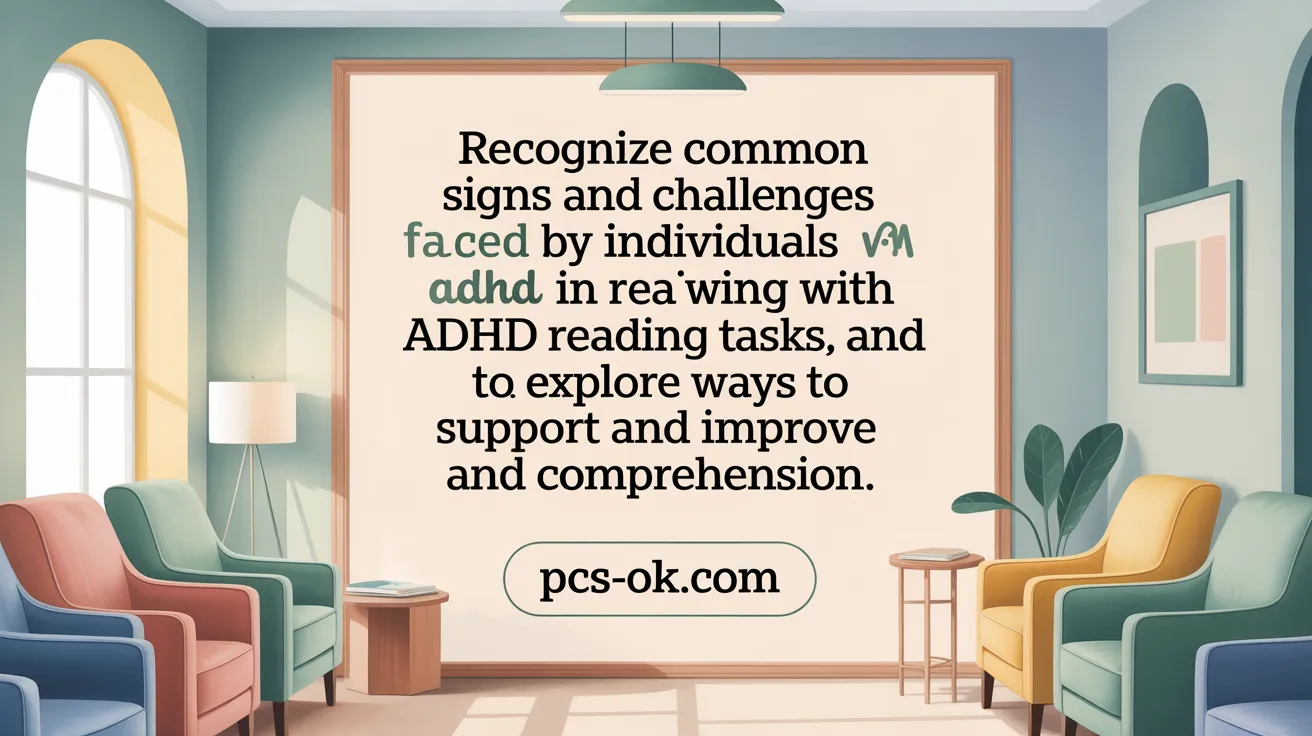
What are the common symptoms and difficulties in reading associated with ADHD?
Children and adults with ADHD often face specific challenges when reading, mainly stemming from core symptoms like inattention, impulsivity, and hyperactivity. These symptoms significantly affect how they engage with texts and process information.
One prominent issue is difficulty maintaining focus on reading tasks. This inattention may lead to behaviors such as skipping words or sentences altogether, missing critical details, or misreading parts of the text. Consequently, comprehension suffers because the reader doesn’t grasp the full meaning or main ideas.
Speed of reading is another concern. Many individuals with ADHD tend to read quickly, often rushing through the material, which hampers understanding. This rapid pace might cause them to skip punctuation, omit words, or lose their place in the text. Slower processing speeds, common in ADHD, further complicate this, making it take longer to decode words and interpret sentences.
Problems with sequencing and the regulation of attention also play a role. Difficulty organizing thoughts and following the logical flow of a passage can lead to confusion and fragmented understanding. These issues can lead to a decreased ability to recall central ideas, especially when working memory or executive functions are impaired.
Signs such as poor expression while reading aloud, frequent misreading, and inconsistent emphasis or intonation are often observed in children with ADHD. These signs indicate underlying struggles with attention regulation, working memory, and cognitive flexibility.
Moreover, many children and adults with ADHD experience comorbid reading disabilities, such as dyslexia. This co-occurrence intensifies reading challenges, making it harder to recognize and decode words accurately, further slowing reading progress.
Overall, these symptoms reflect a complex interplay of attentional deficits, slowed processing speed, and difficulties with executive functioning, all of which contribute to the reading obstacles faced by individuals with ADHD.
Cognitive and Psychological Factors Contributing to Reading Challenges in ADHD
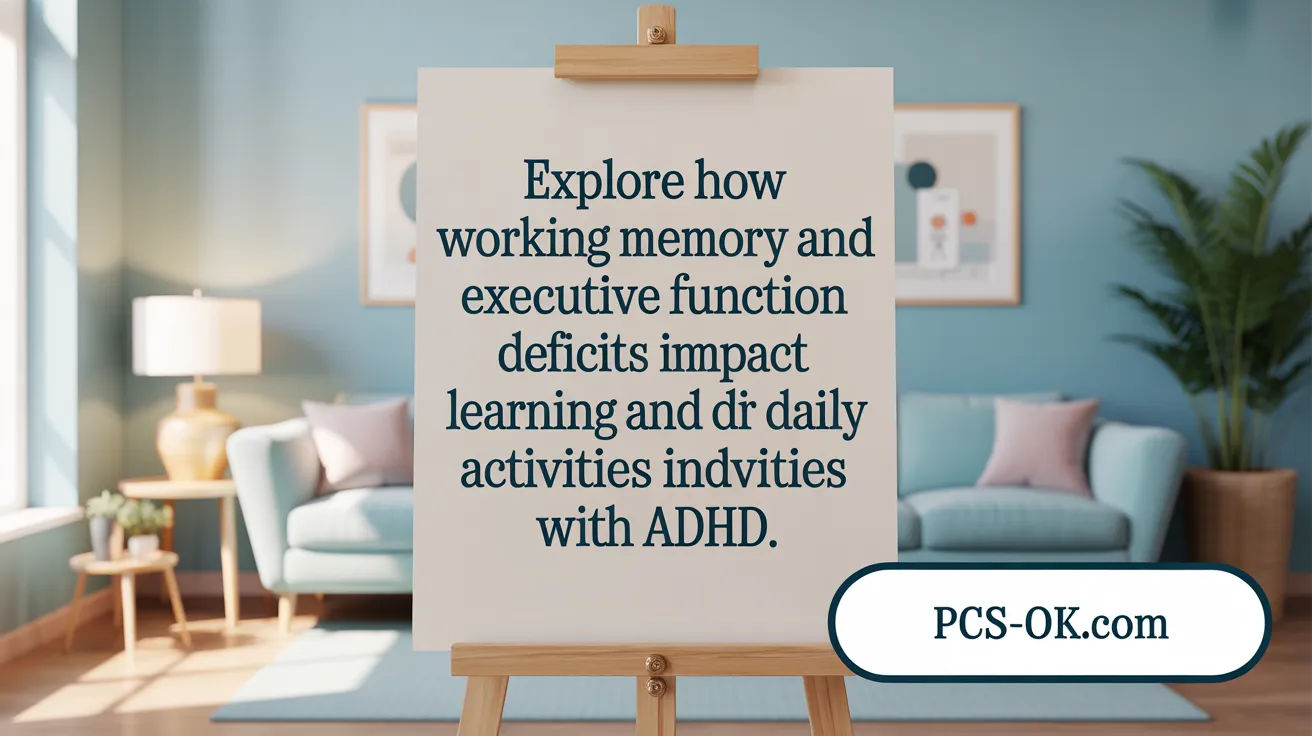
What cognitive and psychological factors contribute to reading challenges in individuals with ADHD?
Children and adults with ADHD often face unique hurdles when it comes to reading. These challenges stem from cognitive deficits, such as problems with working memory, processing speed, and executive functions. Working memory enables individuals to hold and manipulate information briefly, which is crucial for understanding and integrating ideas within a text. When working memory is impaired, children may struggle to remember what they have just read or to connect new information to prior knowledge.
Processing speed—the rate at which someone can perceive, interpret, and respond to information—is often slowed in individuals with ADHD. This slowdown can make reading a laborious task, causing the reader to rush, skip details, or become overwhelmed by lengthy texts. Executive function deficits, including difficulties with planning, organization, and self-control, further impair reading comprehension. These skills are necessary to maintain focus, follow multi-step instructions, and employ strategies like summarizing or re-reading.
Psychological factors also play a critical role. Inattention and distractibility are hallmark symptoms of ADHD that directly affect reading engagement. When a child cannot sustain focus, they may abandon reading altogether or misread sentences. Reduced motivation—another common issue—can lead to avoidance behaviors, especially when reading tasks become frustrating or seem unmanageable.
A specific form of reading impairment observed in children with ADHD is the centrality deficit. This refers to their difficulty recalling main ideas or essential details of a passage compared to controls. Interestingly, even when decoding skills are adequate, these children struggle with comprehension, indicating that the problem lies beyond phonological or recognition abilities.
Further compounding these difficulties are frequently co-occurring reading disorders, such as dyslexia, which involve additional working memory and phonological processing deficits. When these conditions coexist, they create a complex web of cognitive barriers that hinder reading development.
Overall, the interplay of these cognitive and psychological factors—working memory limitations, slower processing, inattentiveness, distractibility, and motivational issues—collectively impairs reading comprehension and fluency in individuals with ADHD. Addressing these areas through targeted strategies and interventions is essential for improving reading outcomes.
Differentiating ADHD-Related Reading Problems from Dyslexia
Characteristics of ADHD-Related Reading Difficulties
Children with ADHD often show reading issues stemming from core symptoms such as inattention, impulsivity, and hyperactivity. They may struggle to focus on the text for sustained periods, skip words, or lose their place frequently. These children might read aloud quickly, omit punctuation, or have trouble understanding what they read, although their decoding skills can be relatively intact.
Moreover, their reading difficulties are often linked to deficits in executive functions like working memory and self-regulation. They may show signs of rushing through tasks, difficulty following multi-step instructions, and losing motivation due to frustration or boredom.
Distinctive Features of Dyslexia
Dyslexia, a specific learning disorder, is characterized primarily by phonological processing impairments. Students with dyslexia often find decoding words challenging, struggle with spelling, and have trouble recognizing familiar words regardless of their attention span or motivation.
Unlike ADHD, which affects attention and executive functions, dyslexia involves a core difficulty in processing the sounds of language. Children with dyslexia typically exhibit slow reading rates, problems with word recognition, and difficulties with phonemic awareness, even when focus and motivation are adequate.
Diagnostic Approaches
Differentiating these conditions involves comprehensive evaluations. For ADHD, assessments often focus on attention span, impulsivity, hyperactivity, and executive functions using standardized questionnaires and observations.
For dyslexia, phonological awareness tests, decoding assessments, and reading accuracy observations are crucial. These tests help determine if the reading difficulties are rooted in phonological deficits or caused by attention-related issues.
Clinicians look for patterns such as consistent decoding problems with adequate attention, or conversely, attention difficulties without significant decoding issues.
Importance of Accurate Differentiation for Interventions
Correctly distinguishing between ADHD-related reading problems and dyslexia ensures that children receive targeted interventions. Children with ADHD benefit from behavioral strategies, accommodations, and interventions aimed at improving attention, working memory, and executive functioning.
Children with dyslexia require phonics-based instruction, decoding practice, and multisensory approaches for reading improvement. Misdiagnosis can lead to ineffective interventions and persistent difficulties.
Patterns in Decoding and Attention
In ADHD, reading errors often relate to attentional lapses, such as skipping words or sentences, reading too quickly, and losing focus. Their decoding skills may be adequately developed, but attentional issues hinder comprehension.
In dyslexia, decoding errors stem from phonological processing problems, regardless of attentional capacity. Children tend to read slowly, misread words, or omit parts due to difficulty recognizing familiar words or sounding out unfamiliar ones.
Assessment Tools for Evaluation
Effective differentiation relies on specific tools, including:
| Tool | Purpose | What It Measures | Additional Notes |
|---|---|---|---|
| Phonological Awareness Tests | Identify phonological deficits | Phoneme manipulation, decoding skills | Critical for dyslexia diagnosis |
| Attention and Executive Function Scales | Assess attention difficulties | Focus, impulse control, working memory | Key for ADHD evaluation |
| Reading Accuracy and Fluency Tests | Measure decoding and fluency | Speed, comprehension, word recognition | Used in both assessments |
| Observational Assessments | Observe reading behaviors | Focus, skipping, re-reading | Complements standardized tests |
Accurate assessment and understanding behavioral patterns help differentiate between these disorders, guiding effective intervention plans.
Scientific Mechanisms Underlying the Link Between ADHD and Reading Challenges
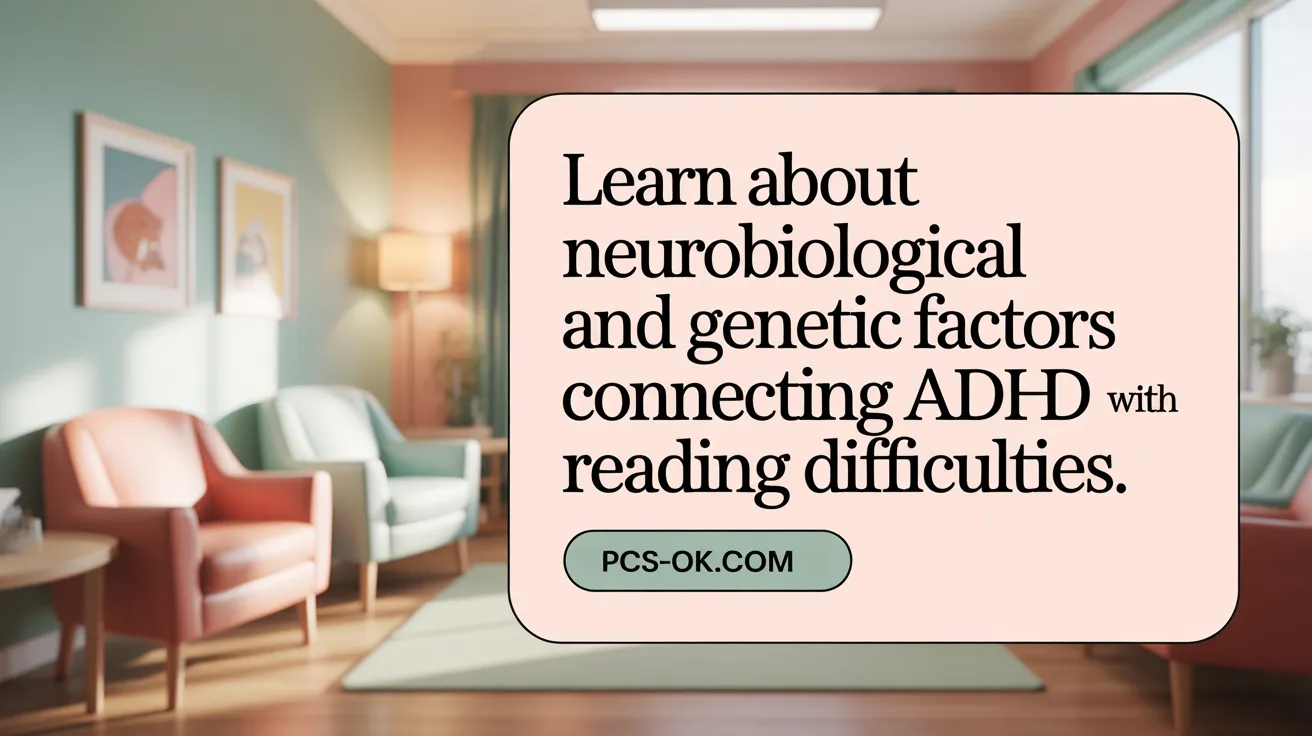
What are the underlying mechanisms linking ADHD to reading challenges according to current scientific research?
Research into ADHD and reading difficulties reveals that their connection is deeply rooted in neurocognitive and genetic factors. These factors operate independently of general intelligence, pointing toward specific neurological differences that influence reading skills.
Neurobiologically, children with ADHD often exhibit differences in frontal lobe functioning. The frontal lobes are crucial for executive control processes such as attention regulation, working memory, and self-regulation — all essential for effective reading comprehension. When these areas are less efficient, children tend to struggle with maintaining focus, remembering central ideas, and connecting ideas within a passage.
Working memory plays a particularly critical role. It allows readers to hold information in mind while processing subsequent parts of a text. For children with ADHD, deficits in working memory hinder their ability to form a coherent understanding of what they read, often leading to skipping details or losing track of main ideas.
Self-regulation, which includes impulse control and the ability to manage attention, also impacts reading performance. Difficulties in sustaining attention and inhibiting distractions mean children are more prone to racing through texts, skipping punctuation, or misreading sentences.
Genetic factors significantly contribute to the co-occurrence of ADHD and reading difficulties. Evidence suggests a shared genetic foundation influences neurobiological pathways that affect both inattentiveness and reading skills. This shared background explains why many children with ADHD also experience comorbid learning disabilities, particularly those related to reading.
Moreover, specific impairments such as graphemic buffer errors—where children struggle with spelling and decoding—and motor control issues can further impair reading and writing in children with ADHD.
In summary, current research highlights a complex interplay between neurocognitive deficits and genetic predispositions. These shared mechanisms disrupt key processes like working memory, executive functioning, and attention regulation, leading to the reading challenges observed in children with ADHD.
Effective Strategies and Interventions to Support Reading Development in ADHD
What strategies, interventions, and accommodations can support reading development in individuals with ADHD?
Supporting reading development in children and adults with ADHD requires a thoughtful approach tailored to their unique cognitive and behavioral profile. These strategies aim to address common challenges such as difficulty focusing, working memory deficits, and impulsivity.
One essential method is the use of multisensory instructional strategies. These involve engaging multiple senses—visual, auditory, tactile, and kinesthetic—to enhance learning and retention. For example, students might use textured letters or read aloud while tracing words, which helps reinforce recognition and understanding.
Structured routines and breaking tasks into smaller, manageable steps are crucial. Short, focused reading sessions with clear goals prevent overwhelm and maintain engagement. Graphic organizers and visual aids help students identify main ideas and supporting details, making comprehension more accessible.
Classroom accommodations also play a vital role. Flexible seating arrangements enable students to choose positions that minimize distractions and increase comfort. Visual schedules and timers can provide structure and predictability, helping students stay on task. Providing regular breaks allows mental rest and reduces frustration.
Assistive technologies offer additional support. Audiobooks and text-to-speech tools allow students to listen to texts, which can improve comprehension and reduce the strain of decoding. Reading apps that highlight text or allow note-taking can boost active engagement with the material.
Parental involvement is another critical factor. Parents can support learning by establishing consistent routines, reading together, and encouraging the use of highlighting, summarizing, and questioning techniques. Positive reinforcement and praise for effort build confidence and motivation.
Educational plans such as Individualized Education Programs (IEPs) or 504 Plans help formalize support strategies tailored to each student’s needs. Behavioral management techniques, including structured rewards and classroom behavior plans, can improve focus during reading activities.
Combining these interventions creates a supportive environment that promotes reading success. While ADHD presents different challenges, with proper accommodations and strategies, children and adults can develop stronger reading skills and confidence.
Challenges and Supports for Adults with ADHD Facing Reading Difficulties
Do adults with ADHD experience similar reading comprehension and focus issues as children?
Yes, adults with ADHD often face challenges similar to children, including difficulty understanding complex texts, losing track of main ideas, and getting easily distracted during reading. These issues stem from impairments in attention, working memory, and impulse control, which affect their ability to focus for sustained periods and process information effectively.
How does co-occurring conditions impact reading abilities?
Many adults with ADHD also deal with additional learning or sensory processing conditions, such as dyslexia or anxiety. These comorbidities can intensify reading difficulties, making it even harder to decode words, remember details, and maintain motivation. Understanding these overlapping issues is crucial for developing effective support strategies.
What strategies like previewing and active note-taking help improve reading?
Previews include scanning titles, headings, and summaries before reading in-depth, which helps set a mental framework. Active note-taking—highlighting key points, jotting down questions, and summarizing sections—keeps focus sharp and enhances retention. Engaging with the material actively helps mitigate attention lapses common in adults with ADHD.
Why is aligning reading material with personal interests important?
Choosing topics that resonate personally or professionally can increase motivation and attention during reading. When adults find content relevant or enjoyable, they are more likely to stay engaged, process information deeply, and retain core ideas, thus reducing frustration and improving comprehension.
How does continuing education and resource availability support adults?
Many organizations offer adult-specific resources, workshops, and courses tailored to improving reading and organizational skills. Access to online platforms, support groups, and educational materials helps adults develop personalized strategies and stay motivated to overcome reading challenges.
What is the role of organizations and published materials?
Organizations like CHADD and ADDitude provide valuable resources, including articles, webinars, and community support tailored for adults with ADHD. Published books and guides also offer practical strategies to improve focus, comprehension, and reading efficiency. These resources are instrumental in empowering adults to manage their reading difficulties effectively.
| Aspect | Focus | Support Resources |
|---|---|---|
| Focus and Attention | Sustaining concentration during reading | Webinars, distraction-reducing tools |
| Co-occurring Conditions | Managing additional learning challenges | Specialized diagnostic tools |
| Reading Strategies | Previewing, note-taking, active engagement | Guides, workshops |
| Motivation | Aligning reading material with interests | Interest-based reading lists |
| Community Support | Access to ongoing help and shared experiences | Support groups, online forums |
| Resources | Available educational and organizational tools | Publications from ADDitude, CHADD |
Moving Forward: Enhancing Reading Success for Those with ADHD
The complex interplay between ADHD and reading challenges is shaped by cognitive deficits, psychological factors, and neurobiological mechanisms. Recognizing the unique ways ADHD impairs reading comprehension, fluency, and retention is vital for implementing effective, individualized interventions. Distinguishing ADHD-related reading difficulties from other learning disorders ensures accurate diagnosis and tailored support. Through multisensory teaching methods, accommodations, and sustained parental and educational collaboration, individuals with ADHD can overcome barriers and thrive as readers. Continued research and awareness bolster these efforts, highlighting a hopeful path to literacy success for all affected by this intertwined condition.
References
- Reading Comprehension in Children with ADHD
- ADHD and Reading: Challenges and Helpful Tips
- Reading Comprehension and Executive Function
- Can ADHD Cause Problems with Reading
- ADHD and reading disability often occur together, study finds
- ADHD and Reading: Understanding the Challenges …
- The Effects of ADHD Treatment and Reading Intervention …
- Why Do Kids with ADHD Struggle with Reading?
